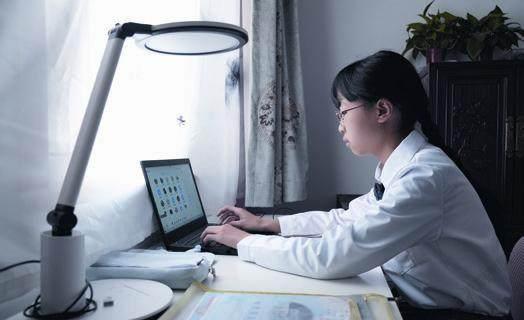TEAM HOME-SCHOOL
By Yuan Yuan
Beijing’s COVID-19 flare-ups have once again made homeschooling the“new normal.”
The latest notice informing all students in the city’s primary and middle schools they would have to “go to class” online came on May 3.
When Zhong Beiling, mother to a 10-yearold boy in Beijing’s Haidian District, first saw the homeschooling news on WeChat, one of China’s most popular super-apps, she became instantly worried. “Homeschooling means a lot of extra work for the parents, including preparing three meals a day for my son,” Zhong told Beijing Review. “My husband and I are both civil servants. We have to take turns asking for leave to look after him.”
Even though Zhong’s mother-in-law also lives with them, the couple needs to be with their son to make sure everything runs smoothly. “Grandma doesn’t really know how to use the various digital applications necessary for the classes; she also tends to spoil her grandson,” the mother said.
Fang Weiwei, a lawyer in the capital’s Chaoyang District, felt the same kind of stress once she heard the news. Her 11-yearold daughter is in the fifth grade. Her husband is a programmer whose time is almost fully occupied by work.
In Fang’s eyes, Zhong is lucky enough to have a live-in motherin-law to lend a helping hand. On May 3, Fang and her husband were hastily trying to figure out a way to deal with the situation; but as it turned out, their stress levels would come down soon enough. Just one day after receiving the homeschooling notice, a new announcement informed all people working in Chaoyang would have to work from home. Problem solved.
The weeks since have been a rare experience for the family of three. “We just assumed the stayat-home period would last for no more than two weeks,” Fang said.“We seldom get to spend so much time together at home.”
Fang created a schedule for her daughter: rise and shine at 7:30 a.m., then breakfast and then online classes from 8:30 a.m. till 3:30 p.m.
The curriculum is well-designed, as Fang commented. The school even hosts online gym classes, encouraging the students to do sports together. During class intervals, teachers and students do a few simple eye exercises to help improve digital eye strain symptoms.
“It’s not the first time for our daughter to be at home studying online,” Fang said. “On previous occasions, we found it more stressful to balance our family duty to take care of her and our work; but this time around, we’ve learned to relax and have even started enjoying the family time.”
Liu Keqin, headmaster of Zhongguancun No.3 Primary School in Haidian, referred to homeschooling as “a gap period” for both parents and kids to take a break from the fast-paced urban life and focus more on family ties.
“Family is a child’s first school and parents are their first teachers,” Liu said. “After the children enter primary school, it doesn’t mean this first school is no longer important. A harmonious family atmosphere is very important to children’s development.”
So far, Fang’s family has been at home for more than 20 days. In their spare time, the three either head outside for a walk or do chores together. “My daughter is now more willing to share her classmates’ stories with us and we’ve had more time to just chat,”she said. “The main concerns are that she gets bored because there are no other kids to play with, and staring at the screen all day might damage her eyesight.”
The eyesight concern is a common one among parents. “Parents should impose a time limit on the use of digital facilities outside of class,” Liu said.
But not all families have been handling the situation equally well. A video of a mother in east Shandong Province breaking down in tears over the daily sight of her son’s nonchalant attitude “in class” was recently trending on many a Chinese social media platform. “I feel so desperate and can’t bear it anymore,” the mother said in the video.“My son couldn’t follow the teacher’s instructions. He couldn’t focus and was just playing around.”
“This is an extreme emotion some parents will experience while trying to help their children study from home,” Liu said.“Some get very anxious about their children’s performance and even sit next to them during the online class; this can make children feel uneasy and even negatively impact their studies.”
“Parents should spend more energy and time guiding their children, make them ask questions and spark their curiosity for things, rather than just focusing on academic scores,” Liu said.

“Some parents have exceedingly high expectations of their children during homeschooling,”said Liu Jiangwei, a psychological consultant in Jiangsu Province.“Some draft rigorous study plans to help their kids catch up during homeschooling, which can put a very heavy burden on those small shoulders.”
Learning is a lifelong process, stretching well beyond school, Liu Jiangwei said, adding that this should be the very philosophy that anxious parents should uphold and pass on to their offspring.
In early May, the Ministry of Education issued the Life Skills Curriculum Standards for Compulsory Education. The classes, including organization and storage, household cleaning and cooking, will officially become part of the curriculum in primary and secondary schools from September onward.
“Being at home is a good chance for the kids to pick up all these skills,” Liu said. “Cooking, for example, is a relaxing time and chatting while cooking is a very good way of communicating.”
Pan Nuo, a fifth-grader from Xi’erqi Elementary School in Beijing, learned how to use the oven and helped her mother bake cakes, casseroles and cookies. “Cooking is what I like doing best at home,” she said in a video she uploaded online. She is also the in-house sports“captain,” encouraging other family members to get in their daily exercise.
“I look forward to going back to school; but before we get there, I’m just enjoying spending time at home,” she said. BR

